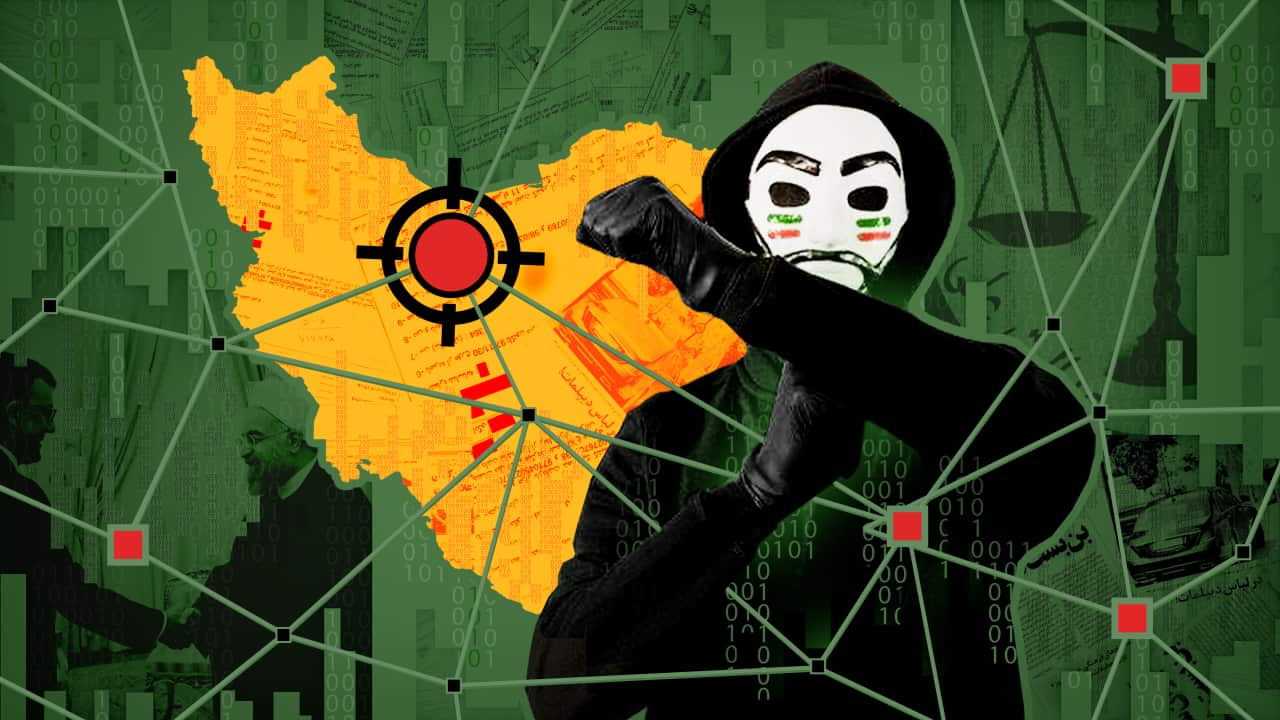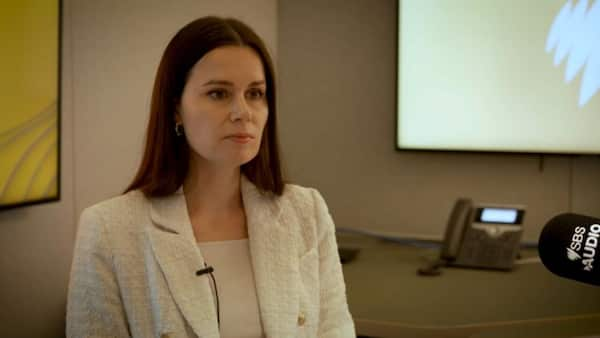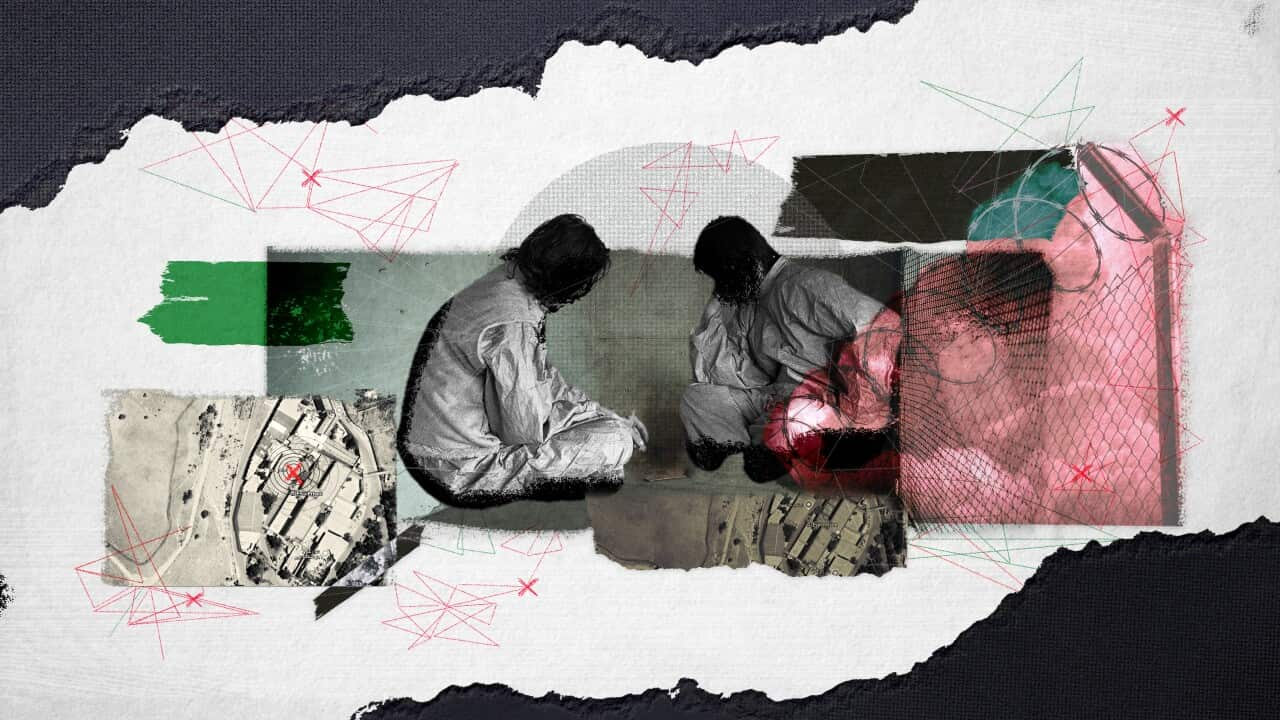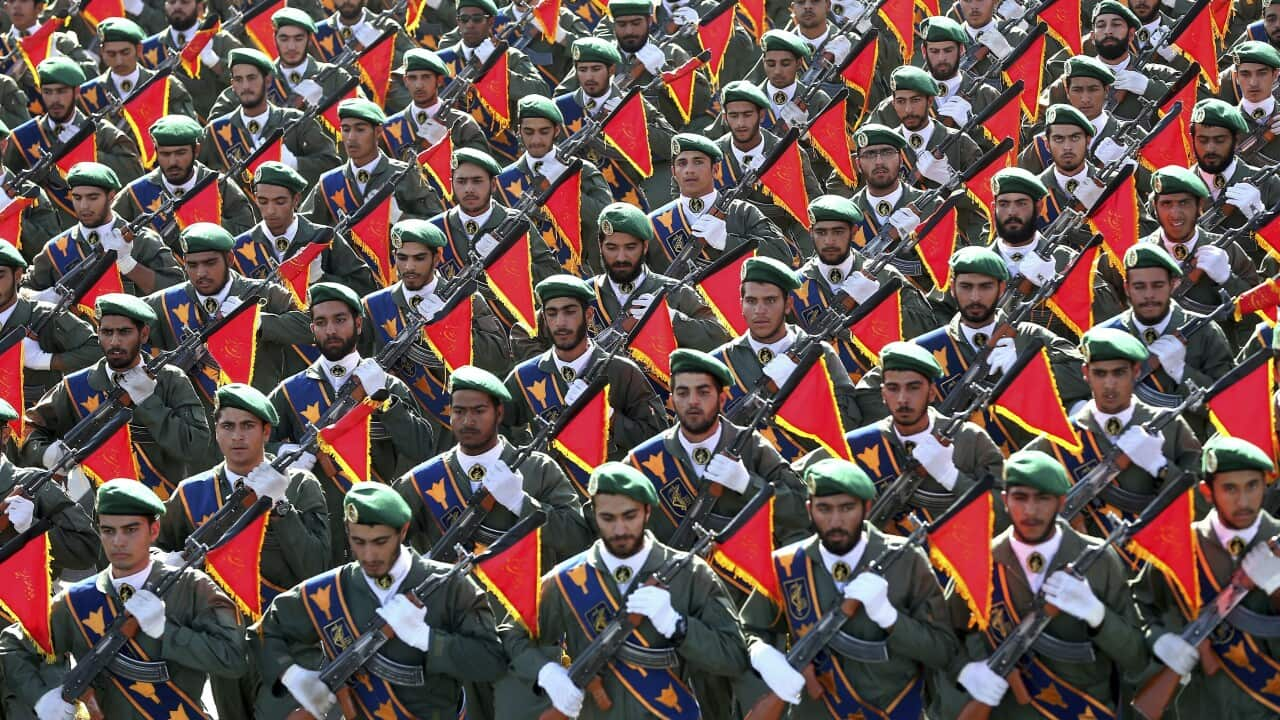

26 min read
Investigation
An Australian diplomat was the target of an assassination plot, leaked documents reveal
According to documents seen by SBS News, the Australian embassy in Iran was attacked in 2019. SBS News can reveal for the first time the alleged perpetrator was arrested and jailed for 17 months before walking free.
Published
By Niv Sadrolodabaee, Jennifer Scherer
Source: SBS News
Image: The Iranian hacktivist group Edaalate Ali hides its identity when presenting online. (Jono Delbridge)
In February 2024, an Iranian hacker group published a cache of classified documents, claiming they had been leaked from the Islamic Republic of Iran's judiciary.
The hacktivist group Edaalate Ali — or 'Ali's Justice' — says it covertly gained access to more than three million digital files relating to cases tried in Tehran's Revolutionary Court between 2008 and 2023.
Among them, an assassination plot targeting the then-Australian ambassador to Iran stood out.
The documents detail how the Australian embassy in Tehran became subject to a Molotov cocktail attack before the ambassador was followed by a man with a gun who intended to kill him.
Speaking with SBS News, an anonymous spokesperson for Edaalate Ali says it carried out a cyberattack on the regime's judiciary with help from "friends who collaborated with us from within these systems", aiming to expose "instances of human rights violations, economic corruption, embezzlement, surveillance and tracking, intrusion into citizens' privacy, and other crimes committed by the regime".
"The Edaalate Ali group has been tirelessly exposing what goes on behind the scenes of the oppressive regime since the beginning of its activities," the spokesperson says of the group's motivations.
Through independent research, SBS News has uncovered 14 documents from a cache that detail attacks on Australia's embassy in Tehran and an assassination plot targeting the former Australian ambassador to Iran, Ian Biggs.

Other leaks by the group have been covered by the BBC and The Guardian, including exposing abuse at Tehran's Evin prison and the cover-up of sexual assault by Revolutionary Guards. Source: Getty, SBS / Jono Delbridge
It is against this backdrop that SBS News has sought to understand how and why Biggs was targeted.
Some questions have answers; others remain a mystery.
'Collusion' and 'intent'
According to the documents, on 20 February 2019, a case was opened in the Islamic Revolutionary Court of Tehran against three individuals accused of "collusion and conspiracy with the intent to act against national security through a plot to [commit an act of] terror and murder Australia's Ambassador".
One man, Kamran, was found guilty and sentenced to six years in jail. SBS News has changed his name for privacy reasons and due to the sensitive nature of certain allegations included in this story.
The documents state that he "repeatedly threatened to kill the ambassador and the embassy staff" and told international bodies and Australian authorities that he would "kill" Biggs.

Credit: Jono Delbridge
The documents don't reveal the date of the first two attacks but say Kamran hired two people to act as accomplices.
They were also arrested but later released due to insufficient "evidence" and "facts".
SBS News contacted Iran's judiciary several times to confirm the events as described in the documents. It did not facilitate SBS News' requests.
While SBS News cannot independently verify Kamran's case files, the documents have been reviewed by three independent Iranian lawyers with experience in Iranian courts and with Iranian legal documents. They have each told SBS News the documents appear genuine and display legitimate hallmarks of Iran's court system.
"In my opinion, based on appearance, these documents can be citable," says Ghasem Boedi, a former Iranian lawyer in exile with 20 years of experience in Iranian courts.
These documents have the formatting that we know in Iran's judicial system.
"These documents were part of the [judicial] digital system, and they included the 16-digit document numbers, correspondence number, the style of the headers and the fonts used ... These documents include all of the trial stages in Iran."
The documents referenced in this story come in various formats. Some appear to be legal documents featuring signatures, barcodes, fingerprints and headers from the judiciary, while others, such as letters and HTML files, appear to include raw text taken from official documents but which lack these hallmarks.
"All information we publish is shared after the authenticity is ascertained," an anonymous Edaalate Ali representative tells SBS News.
"In cases where [sharing the documents] does not endanger our sources, we publish the evidence. In cases where the source may be endangered, we only report the issue."
In attempting to corroborate the contents of the documents, SBS News made every effort to seek a response from the Department of Foreign Affairs and Trade (DFAT) to determine whether the department had any knowledge or record of the alleged embassy attacks or the plot to assassinate ambassador Biggs. After multiple media requests and calls to the department, they refused to confirm or deny the claims.
SBS News also approached the Australian Federal Police to enquire whether the agency had any knowledge about the case or alleged threats sent by Kamran, but this request was also declined.
While the AFP's role is to enforce criminal law domestically, it also has officers stationed in more than 30 countries, whose remit includes international law enforcement, capability development and collaboration with international agencies such as Interpol. SBS News enquired whether the AFP had any presence in Iran during the time of the alleged attacks. It again declined to comment.
While no government official would provide an on-the-record comment to SBS News about the documents, this is not unusual when it comes to matters of foreign intelligence or diplomacy.
Ian Parmeter is a research scholar at the Australian National University's Centre for Arab and Islamic Studies and previously worked at the Office of National Assessments (an intelligence agency now known as the Office of National Intelligence) and DFAT. He is also a former Australian ambassador to Lebanon.
Speaking hypothetically about whether the Australian government would publicise an attack on an Australian embassy, he tells SBS News: "The question of whether we would make that public at this stage is one that I think would have to be decided on the circumstances.
The preferred approach of the Australian government would be to resolve it with the Iranian government … to essentially reduce the level of stress and to ensure that the Iranian government is prepared to uphold its responsibilities under the Vienna Convention.
The 1961 Vienna Convention on Diplomatic Relations requires that the host country — in this case, Iran — protects the embassy premises and its personnel, with immunity from the host country's jurisdiction.
A 'conspiracy' to commit an act of 'terror'
Despite the lack of input from authorities, SBS News discovered a bundle of related documents while scouring the cache that reveals broader details about the trial.
The trio of men were also accused of "carrying and possession of a tear gas spray", "defacing the number plate of a motorcycle", and "carrying and possession [of] a handgun with 11 military cartridges".
Iranian lawyers who reviewed the documents as part of this investigation point out that the section of the legal paperwork that would normally name the complainant has been left empty.
Boedi explains: "In this case, what I understand [from the letters is] the complainant was the ministry of intelligence itself. In documents, they usually don't use the name of the ministry."
According to the documents, during the trial Kamran was kept separate from the two other accused while they were held on charges in Evin prison — a prison in Tehran renowned for housing political detainees.

Evin Prison in Tehran, Iran. Credit: Google Earth
"If they are not under arrest for any other charges, they should be released immediately, and the results should be sent to this branch," reads one letter sent by Behrooz Shah Mohammadi, investigator of the seventh branch of Shahid Moghaddas Court in Tehran, to the head of the 209 section of Evin prison.
Section 209, where Kamran was kept, is reportedly controlled by Iran's intelligence ministry. While the documents state that Kamran was offered bail, he could not meet the conditions due to a lack of funds.
Boedi explains: "The 209 section of Evin prison is more related to political prisoners, those who are charged with crimes against national security ... or [in cases where] the plaintiff is the Ministry of Intelligence or IRGC's (Islamic Revolutionary Guard Corps') intelligence."
The IRGC is a branch of the Iranian armed forces, separate from the army, tasked with defending the regime from foreign and domestic interference.
The documents show that 26 days after his arrest, Kamran was found guilty of all charges and jailed.
In a letter to the head of Tehran's Revolutionary Court, the deputy public prosecutor writes that the criminality of the accused is "certain" and "definite" according to article 610 of the Islamic Penal Code.
Based on charges of collusion and conspiracy, certain conditions would need to have been met under the penal code to deliver this verdict, explains former Iranian lawyer Marzieh Mohebi.
"The conditions for this law to be fulfilled are that there are two or more suspects, that these individuals agree to commit a crime, and that this crime is against the internal and external security of the country," Mohebi says.
"The law even says that they don't necessarily have to commit the crime: To procure the means, like buying a gun, [it] will apply.
"Why did they charge him with collusion and conspiracy if only one person was involved? This is a question that we don't have the answer [to]."
The search for a motive
Kamran's motive is not clearly described in the leaked documents seen by SBS News; however, what appears to be his defence statement reveals that he spent time in Australia before the attacks.
The statement notes he holds a master's degree and was accepted to study for his doctorate at the University of Newcastle in 2014, alleging that while studying at the uni, a staff member offered Kamran sexual relations.
The statement claims that Kamran rejected the staff member, who responded punitively, using "false excuses" to prevent him from presenting an article at a scientific conference.
The document also says he travelled to Iran during his studies, but after returning to Australia, faced severe financial hardship and the cancellation of his scholarship. Kamran then returned to Iran and filed complaints to human rights organisations.
In another document, he alleges he was "sexually raped by university officials".
Using Kamran's real name, SBS News contacted the university to confirm his attendance and seek comment on the claims outlined in the documents. According to the University of Newcastle's deputy vice-chancellor, Professor Mark Hoffman, Kamran started his PhD studies at the university in 2014, but "following a robust administrative process", his candidature was terminated in 2016.
Consequently, his enrolment and scholarship were also cancelled.
In response to Kamran's claims, Hoffman told SBS News: "The safety of our staff and students is our highest priority, and we take all reports of inappropriate behaviour very seriously … [Kamran] lodged several internal and external complaints alleging sexual harassment and victimisation.
"After separate and thorough review processes ... [his] internal complaints were dismissed by the University on the basis of insufficient evidence and his external complaint to the Australian Human Rights Commission was terminated on the basis that it was lacking in substance."
A spokesperson for the Australian Human Rights Commission told SBS News: "The Commission does not comment on or release information about individual complaints … This includes being unable to confirm or deny whether a complaint has been made."
A statement of indictment from the cache, which was issued by the deputy public prosecutor, says that upon his return to Iran, Kamran saw a psychiatrist in his hometown in the Azerbaijan province for six months. After making a "partial recovery", he travelled to Tehran with the intent to assassinate Biggs and was later arrested by the intelligence and security police.
A translation of one document outlining the court's final judgement states: "The total of the operations carried out is to damage the reputation of the Islamic Republic in the international community."
"It has been done in accordance with the goals of hostile and imperialist enemies [of Iran] — Israel and the US.
"It acts against the security of the country, which can cause many problems for the national security and bilateral relations between the Islamic Republic [of Iran] and Australia."

Credit: Jono Delbridge
Despite the court’s assertion that the attacks were carried out "against national security" and with the intent to commit an act of terror, the court appears to have exercised some leniency in this case.
Boedi says the six-year prison sentence contradicts the severity of the alleged crime, suggesting this might indicate that the presiding judge "approved" the motive as described in Kamran's defence statement.
"The judge should explain the reasons behind their decision. In these documents, these reasons don't exist so we can't say if the motive was personal or systematic," Boedi says.
"It is not possible to find the [actual] motive from these [documents], as we don't have enough access to the reasons and proofs of the case.
These three have been interrogated and were kept separated, but we don't see the content of the interrogation in the sentence.
According to the documents, the final verdict was signed by the late Judge Mohammad Moghiseh, who, during his life, was frequently referred to by critics of the Iranian regime as a "hanging judge". He was known for issuing harsh sentences, including the death penalty, to opponents of the regime dating back to the 1980s. He was also sanctioned by the European Union, the United States and Canada over alleged human rights abuses and what the US Treasury described as "countless unfair trials, during which charges were unsubstantiated and evidence was disregarded".
Moghiseh was assassinated in January 2025 by a lone gunman.
It is unclear why the judge issued such a seemingly lenient sentence for a crime of this nature. However, lawyers say it appears that Biggs’s Australian nationality was considered part of the grounds.
“A similar case involving a governor, provincial official, or a member of parliament in Iran might be met with a much harsher punishment, maybe even the death penalty, under Iranian law," Boedi says.

Credit: Jono Delbridge
This was rejected by the court. However, it approved a reduction in his sentence from six years to less than four.
He would ultimately spend just under 18 months in prison.
A 'box-ticking' exercise
One year after his arrest, during Nowruz — Persian New Year — in March 2020, a letter from the cache appears to have been sent by the assistant prosecutor for Tehran's Public and Revolutionary Prosecutor's Office to Evin prison. In it, the assistant prosecutor references a public pardon order from the Supreme Leader of Iran, Ali Khamenei, and requests Kamran's release within 24 hours.
At times, during different religious and national events, Khamenei will issue orders to pardon some prisoners. SBS News can confirm that in March 2020, such an order was issued.
But the pardon was withdrawn due to conditions that were not met.
"We announce that the pardon order was declared because of mistakes in the calculations of this branch. Hence, the pardon is withdrawn. So, we ask you to add this to his records and stop his release," reads one letter to the head of Evin prison.
It is not clear whether the decision to revoke the pardon was genuinely an administrative error or there were other motivating factors, but around four months later, Kamran walked free anyway, after serving less than a third of his sentence.
He was paroled based on Article 58 of the Islamic Penal Code, which stipulates the terms of a conditional release.
"Any prisoner serving more than 10 years is eligible [to ask] for parole after serving half of the sentence. Those serving less than 10 years are eligible after serving one-third of the sentence," Mohebi says.
This type of parole is widespread in Iran.
Another letter to the head of Evin prison shows Kamran was released in late July 2020 after spending around 17 months in jail.
"I see a type of connivance in this case," Boedi says.
"I think this case was more a box-ticking [exercise]. It doesn't show that a serious process has happened for this person.
"The person has possessed a gun and tried to kill an envoy of another country and was in jail for less than a month until the final verdict came. Normally, this takes months for national security crimes."
SBS News tried to contact Kamran via multiple channels but was unable to reach him each time.

Credit: Jono Delbridge
Threatened by the IRGC: Who is Ian Biggs?
The target of Kamran's alleged plot, Ian Biggs, was appointed as Australia's ambassador to Iran in May 2016.
Currently serving as Australia's ambassador to Austria, Biggs has had a wide-ranging career as a diplomat: He has served as ambassador to Türkiye and Saudi Arabia, as special assistant to the International Atomic Energy Agency's director general and as DFAT's ambassador for Arms Control and Counter-Proliferation.
He was appointed as Australia's ambassador to Iran less than a year after the (JCPOA) was adopted, an agreement to limit Iran's nuclear program in return for sanctions relief and other provisions.
In 2017, in his role as ambassador, Biggs publicly backed the nuclear deal.
"Australia was extremely supportive of the 2015 Joint Comprehensive Plan of Action, [its] position was very much consistent with the rest of the international community," says Dara Conduit, a political science lecturer and Middle East expert at the University of Melbourne.
"[But] Iran is an incredibly fragmented country politically … There was much domestic opposition to the JCPOA, particularly from hardliners and the Islamic Revolutionary Guards Corps."
READ MORE

The Iran nuclear deal explained
During Biggs's tenure, in 2018, Australia and Iran marked 50 years of unbroken diplomatic relations, a feat that stood apart from other Western nations, Conduit says.
"Australia is unusual among Western states in that it has maintained a fairly consistently cordial diplomatic relationship with Iran since it established its embassy in [Iran] in 1968," she says.
That has made Australia believe that it has a different relationship with Iran to some of the other Western states.
By contrast, the United States no longer has a consulate in Iran: It closed its embassy in 1980 during the . Similarly, the United Kingdom closed its embassy temporarily in 2011 after an attack on its premises.
According to a 2018 study tour report from the Australian Institute of International Affairs Victoria, the Australian embassy in Tehran had been "building up" its staff over the three years prior.
"Currently [in 2018], 11 Australian-based diplomats are working at the embassy in Tehran alongside 40 local staff. Austrade now has a permanent post at the Australian embassy. This makes the embassy one of Australia's largest middle-sized posts around the world," the report reads.
"Australia's role in Iran has historically been to facilitate trade between the two countries and to foster mutually beneficial economic opportunities. However, Australia has recently expanded its interests in Iran, focusing on sectors including water security, education, and tourism."
According to Conduit, Australia-Iran relations soured in 2017 after Australia arrested Iranian-born on a US extradition request. In September 2018, , an Iranian PhD student who was studying at the University of Queensland and was accused of violating US sanctions.
"By late 2018 and early 2019, this is a situation that Australia-Iran relations found themselves in: After five decades of strong constructive relations, suddenly the Australia-Iran relationship had descended into hostage diplomacy," Conduit says.
"Australia had discovered that while it felt it had a unique position in Iran and unique value in Iran, that actually Iran viewed it as no different to any of [Australia's] allies, and that it was willing to target it through hostage diplomacy as well."
'They were very angry'
In 2018, Australia's diplomatic relationship with Iran was thrust into the international spotlight.
On 12 September, Australian-British academic Kylie Moore-Gilbert was arrested in Iran on espionage charges.
Her arrest came around five months before Kamran's case was opened. Biggs, as Australia's ambassador, visited Moore-Gilbert in prison.

Source: Getty, SBS / Jono Delbridge
"When it comes to Australia, Iran is pretty brazen and doesn't really seem bothered by any damage to the relationship that might ensue if it takes Australian hostages."
At least three other Australians were arrested between late 2018 and mid-2019, including University of Melbourne academic Meimanat Hosseini Chavoshi in December 2018 and
"Iran was, to a certain respect, targeting Australia during this period of 2018 to 2019 ... it's kind of inconceivable that it wouldn't have had an impact on the Australia-Iran relationship," Moore-Gilbert says.
During her imprisonment, she says the judge presiding over her case limited her consular access as punishment, and she also observed the relationship between her interrogators and Biggs sour.
In her last interaction with Biggs, Moore-Gilbert says she grabbed him around the legs in desperation after an IRGC member tried to terminate their meeting.
"This made them very angry; they attempted to extract me, they attempted to physically pull me away from the ambassador, but didn't succeed," she recalls.
"Then they started threatening the ambassador that he needed to leave the room.
I believe they were very angry with him because he wasn't seen to be on their side; obviously he was on my side ... I think that this incident potentially soured their relationship with the ambassador.
In March 2019, one month after the case was opened against Kamran, an Iranian conservative newspaper Vatan-e-Emrooz published a front-page article titled Dressed as a Diplomat, accusing a slew of foreign diplomats in Iran, including Biggs, of working with spies.
"According to the information obtained, Ian David Biggs, the Australian Ambassador to Iran, is another ambassador who is a colleague of spy and intelligence services," the article alleged.

Credit: Jono Delbridge
"The IRGC did not seem to have a fixed attitude toward Australia. It seemed to depend on which IRGC member you spoke to," she says.
"I heard some positive things, but I also heard ranting and raving against Australia, accusing Australia of being the lapdog of the US [and] accusing the embassy of being a spy espionage hub that's used by the US and the CIA."
Conduit says Moore-Gilbert's case would have "no doubt" put significant strain on the Australia-Iran relationship.
"This was a wake-up call for Australia [that] it was no longer immune to Iran's international pariah behaviour," she says.
After the Kylie Moore-Gilbert situation, I think the Australia-Iran relationship lost its innocence.
Another strain on the relationship came in August 2019 after then-prime minister Scott Morrison announced his support for a US-led mission to patrol the Strait of Hormuz — a highly important geo-political location for Iran and primary channel for oil transit — sending a navy frigate, defence force personnel and surveillance aircraft.
Shortly after this, on 28 August 2019, Biggs's tenure as ambassador came to an end.
SBS News approached Ian Biggs several times for comment about his experiences in Iran and to put specific questions to him. He declined an interview, deferring to DFAT and saying: "I cannot comment on operational security or intelligence issues."
Speaking from his experience as a former ambassador, Parmeter says: "I'd be very surprised if an ambassador in any country who became aware of a particular threat against him or her, should we say, or against any of the embassy staff, would not report that.
"Essentially, it would be most important for the head office in Canberra to be aware of that attack because they would then be able to discuss it with Australian intelligence authorities … And also to make a decision on just what the implications for the safety of the individual and the premises might be."
LISTEN TO

One on One: Dr Kylie Moore-Gilbert on Iran's hostage diplomacy
SBS News
08:22
Attacks on foreign embassies in Iran
Biggs is not the only foreign diplomat to be targeted in Iran.
Since the 1979 Islamic Revolution, there have been at least 12 attacks on foreign diplomatic missions in Tehran.
"These attacks are more reflecting the domestic political divisions between different groups and different factions, including the moderate, the hardliners [and] the revolutionaries, and this division actually has been expressed in very ideological and political views," says Alam Saleh, a senior lecturer in Iranian Studies at ANU's Centre for Arab and Islamic Studies.
"Usually, those who are doing it are supported by the state, the deep state at least, or those hardliners; very powerful and influential hardliners. However, none of them have been officially supported by the state.
"[Deep state] are those [people] who are not elected, those who are appointed usually by the supreme leader; very powerful people that … are always there, [and] are deeply trusted by the political establishment inside the country."
Over the past 46 years, the embassies of Egypt, the US, Saudi Arabia, Kuwait, the Soviet Union, Denmark, Austria, Pakistan, the UK and Azerbaijan have all been attacked.
Since these attacks took place, several embassies have relocated or closed altogether.
According to the Australian embassy's Facebook page, its location changed in December 2019. SBS News asked DFAT whether this relocation was in any way related to the alleged embassy attacks or the plot to assassinate Biggs, but the department declined to comment.
"The Saudis have changed [their] location actually at the moment," Saleh says.
"They are often residing in a five-star hotel in Tehran, which shows that they don't feel secure in Tehran … it undermines the state's [Iran's] legitimacy."
Saleh says there often seems to be a correlation between the timing of an attack on a particular country's diplomatic mission and a flare-up in tensions between that country and Iran.
"What makes them [the reported attacks] quite similar is that they are often supported by the hardliners, they are against the Western influence in Iran or any kind of relationship between Tehran and any other Western powers," he says.
In other words, it is very anti-Western [in] character and features, and also it's usually [carried out] by groups which are not identified.
"For instance, the 2011 attack on the British embassy happened because of the sanctions imposed by the British government against Iran because of its nuclear activities. In 2016, the Saudi embassy [was] attacked because of the execution of a Shia cleric, Mr [Nimr Baqir] Al-Nimr."
According to international law, embassies are 'inviolable', meaning the premises must not be entered without the consent of the ambassador or head of mission. Article 22 of the Vienna Convention also mandates that the host country protect the premises.
"Although the state has condemned, for instance, the attack [on] the Saudi embassy and the British embassy ... we have very little evidence that those [who] have participated have been persecuted by the state [of Iran]," Saleh says.
"Therefore, we see that it is a kind of a non-official way to express the deep states' attitudes towards the foreign policy, the Western policies and the regional policies as well."
While the events described in the leaked documents may be part of a broader pattern of hostility towards foreign missions in Iran, according to Parmeter, attacks on Australian embassies in the Middle East are "not super common".
"Although we're part of the 'five eyes' community (an intelligence alliance comprising Australia, Canada, New Zealand, the UK and the US), we're not seen as being a country [that] has an aggressive foreign policy.
"Individuals who [may be] opposed to the policies of Western governments will often seek to make the point by attacking, first of all, the Americans … but also the British, French, even German [embassies].
"It doesn't mean that we're immune."
This story was produced with support from SBS Persian.





